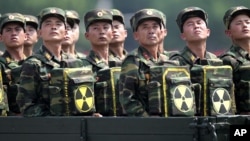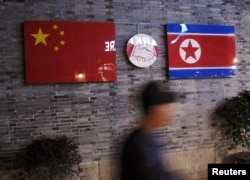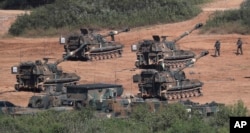Supporters and critics are debating reports that U.S. President Donald Trump has adopted a "madman" strategy in international negotiations, with some viewing it as a high-risk but effective tactic and others seeing it as evidence of a foreign policy in disarray.
The "madman" theory is ascribed to former U.S. President Richard Nixon's foreign policy. To negotiate an end to the Vietnam War on favorable terms, Nixon tried to portray himself as a crazy and volatile leader. He even raised the Strategic Air Command's readiness level in 1969 to make it seem as if he was possibly preparing for a nuclear strike, in an attempt to pressure the Soviet Union to intervene to end the war.
The effectiveness of Nixon's strategy remains a point of debate, as a cease-fire agreement was not reached until 1973 and the communist forces ultimately took over all of Vietnam in 1975.
Calculated tweets
Trump, some analysts say, is now employing the "madman" approach to try to prevent North Korea from developing a nuclear-tipped intercontinental ballistic missile capable of targeting the U.S. mainland.
"Today, with Donald Trump leading the United States, the madman doctrine is back with a vengeance," Nina Kruschchva, professor of international affairs and associate dean for academic affairs at The New School, a private research university in New York, and a senior fellow at the World Policy Institute, wrote on the MarketWatch website.
Trump himself urged his top trade negotiator, Robert Lighthizer, to portray him as a madman during an Oval Office meeting last month attended by at least three Cabinet secretaries, according to an article on the website Axios.
According to the account, attributed to unnamed sources "familiar with the conversation," Lighthizer proposed to tell his South Korean counterparts they had 30 days to make concessions or the United States would pull out of its trade deal with Seoul.
"No, no, no," Trump replied, according to the Axios account, which has not been denied by the White House. "That's not how you negotiate. You don't tell them they've got 30 days. You tell them, 'This guy's so crazy he could pull out any minute.' "
Trump's more recent tweets, saying dialogue with North Korea was a "waste of time," and apparently rebuking Secretary of State Rex Tillerson for saying talks with Pyongyang were happening, may be part of a calculated effort to put America's adversaries on the defensive, some analysts say.
"Having Mr. Trump sending out tweets like he sends, saying the things he says, I think those put some unpredictability into the American approach, and presumably into the minds of the North Koreans, and maybe as importantly with the People's Republic of China and even the Russians as well," said security analyst Grant Newsham of the Forum for Strategic Studies in Tokyo.
Trump's confrontational rhetoric on North Korea, warning of an overwhelming "fire and fury" military response to a possible attack, and calling North Korean leader Kim Jong Un "Little Rocket Man," is a sharp departure from the method of past presidents who tried to reduce tensions through traditional diplomacy.
Critics say the president's aggressive tweets, which often contradict senior members of his own security team who have downplayed the possibility of military conflict, reflect growing disagreements over North Korea policy within the Trump administration.
"There's a lot of reckless talk, and it seems to me with the incoherence coming out of Washington, the U.S. is embroiled in a leadership crisis," said Northeast Asia security analyst Daniel Pinkston with Troy University in Seoul.
Dead ends
The Trump administration has indicated a preference for economic sanctions and diplomacy to force the Kim regime to choose between denuclearization and survival. Yet the U.S. has rejected Beijing's proposal that North Korea freeze its nuclear and missile programs in exchange for a halt to U.S.-South Korean military exercises.
Washington needs international cooperation to impose harsh sanctions on Pyongyang, especially from China, which is responsible for 90 percent of all trade with the isolated nation.
But David Straub, a North Korea analyst with the Sejong Institute, said the president's repeated emphasis on possible military action could backfire if China and Russia concluded the "United States is lying when it says that its policy is to seek a negotiated settlement." Beijing and Moscow, he said, could respond by easing sanctions and increasing support for their ally in Pyongyang.
North Korea also has a history of breaking past nuclear freeze deals by operating a secret nuclear weapons program in violation of a 1994 agreement, refusing to comply with a 2007 agreement to allow international inspectors access to suspected nuclear sites, and conducting a nuclear test in 2009 after the U.S. removed North Korea from its list of states that sponsor terrorism.
Straub said it was unlikely that Pyongyang would give up its nuclear deterrent under the threat of force or because of economic pressure alone.
"I am very skeptical that there is a potential for negotiations because of what I believe to be North Korea's true objectives in all of this, which are eventually to use leverage over the United States, to kick the United States off the Korean Peninsula," said Straub, who also participated in North Korea denuclearization talks as a U.S. diplomat during the administration of George W. Bush.
High risk
If North Korea will not yield to pressure, the "madman" approach may draw the U.S. into using military force to stop Pyongyang from developing nuclear ICBM capability, or because of some miscalculation or unforeseen event, Newsham said.
"We are headed that way anyway," he said. "And that risk is coming unless … you can interrupt that trend line North Korea is on."
South Korea has stated it would oppose any U.S. preemptive military action in the region, as millions of its citizens live in range of North Korean artillery positioned along the border.
The peaceful alternatives, often advocated by officials and analysts, are to continue pressuring Pyongyang to change through enhanced military deterrence, containment and sanctions, or to transform Korean society from within though unfettered aid, economic engagement and the influx of information from the outside world.



